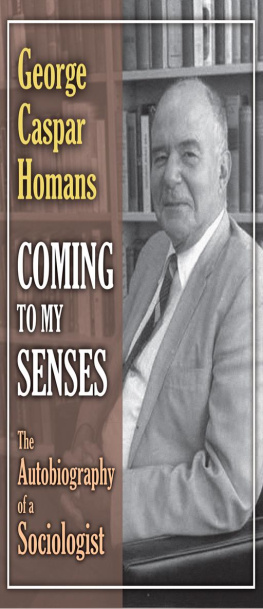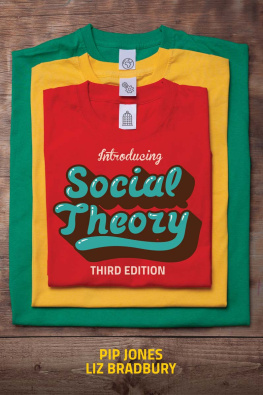COMING TO MY SENSES
George Caspar Homans
COMING
TO MY
SENSES
The
Autobiography
of a
Sociologist
First published 1984 by Transaction Publishers
Published 2017 by Routledge
2 Park Square, Milton Park, Abingdon, Oxon OX14 4RN
711 Third Avenue, New York, NY 10017, USA
Routledge is an imprint of the Taylor & Francis Group, an informa business
Copyright 1984 by Taylor & Francis.
All rights reserved. No part of this book may be reprinted or reproduced or utilised in any form or by any electronic, mechanical, or other means, now known or hereafter invented, including photocopying and recording, or in any information storage or retrieval system, without permission in writing from the publishers.
Notice:
Product or corporate names may be trademarks or registered trademarks, and are used only for identification and explanation without intent to infringe.
Library of Congress Catalog Number: 84-77
Library of Congress Cataloging-in-Publication Data
Homans, George Casper, 1910-
Coming to my senses.
Includes index.
1. Homans, George Casper, 1910- . 2. SociologistsUnited StatesBiography. I. Title.
HM22.U6H653 1984 301'.092'4 [B] 84-77
ISBN 0-88738-001-8
ISBN 13: 978-1-4128-5152-7 (pbk)
ISBN 13: 978-0-88738-001-3 (hbk)
To my wife
Nancy Parshall Homans
who bore it bravely
Grau, teurer Freund, ist alle Theorie
Und grn des Lebens goldner Baum.
Goethe, Faust
Contents
Acknowledgments
The author gratefully acknowledges the following publishers and institutions for permission to use copyrighted and other material:
Massachusetts Historical Society, Abigail Adams Homanss letter to Henry Adams, 27 August 1910. Unpublished ms.
Justice Holmess letter to Harold Laski, in Holmes-Laski Letters: The Correspondence of Justice Holmes and Harold J. Laski, 1916-1935. Cambridge: Harvard University Press, 1953.
A passage in Chapter 10, from George C. Homans, Sentiments and Activities, pp. 9-10. New York: The Free Press, a Division of Macmillan Publishing Company, 1962. Copyright The Free Press.
Chapter 12 was originally a paper, Sailing with Uncle Charlie, delivered to a meeting of the Massachusetts Historical Society and later published in its Proceedings 76 (1964): 55-67. Reprinted, Atlantic Monthly 216 (1965): 39-45. Copyright by George C. Homans.
The excerpt from The Middle Span, by George Santayana, is reprinted with the permission of Charles Scribners Sons. Copyright 1945 by Charles Scribners Sons; copyright renewed 1973.
George C. Homanss lines in Chapter 22 are from his poem The Witch Hazel, in Harvard Magazine 72 (1970): 15. Copyright 1970 by the Harvard Bulletin, Inc.
Abridgements of Chapters 7, 8, 9, 10, 18, 19, 20, and 21 have been previously published in George C. Homans, Steps to a Theory of Social Behavior, Theory and Society 12 (1983): 1-45. Copyright 1983 by George C. Homans.
Preface
What right have I to add another autobiography to the long list, especially when, in The Education of Henry Adams, proved that she was no slouch at the business. I can only promise that the word education will certainly not recur in the title of the present book, even though it is concerned with my education, and that its style will not resemble those of its predecessors. But the question, Why? still nags.
I have retired from the academic profession; I have time on my hands; I believe I have still something to say to my colleagues and even to the public, for their social behavior is part of my subject; I should like to try to say this in some form other than the usual treatise, and I enjoy writing, especially about my favorite subject, myself.
If only for reasons of space no autobiography can tell all": it must be highly selective, and this one is more so than most. Its heart is an effort to describe how over many years I came to my senses, that is, reached the ideas I now hold about the nature of social science, especially the part theory and explanation play in it. Mine have never been popular ideas, which gives me all the more reason to hammer away at them. The guts, then, of this book is an intellectual autobiography.
But a book that is no more than an intellectual autobiography must tend to boredom, so I have added topics to enliven the subject and to show, by the way, that I was never a wholly disembodied mind. In particular I have added much about my command of small warships, for that provided me with much vivid familiarity with the more elementary forms of social behavior. I have also added some chapters about my own social background and social life. They do not have much to do with the intellect, but a social scientist cannot live on ideas alone: he must batten on the stuff of society itself.
By the same token, I have left out some of the principal ornaments of most autobiographies. I have almost nothing to say about women, for most of us the most central of topics. What today is a book without sex in it? Yet that has made women almost too sensitive a topic. I have almost nothing to say about politics either, though a reader will easily guess what my main political position is. As with sex, almost everything we read today is politicized, and I have little that is even vaguely original to add to the discussion. Less justifiable is my failing to describe the everyday life of the field researcher, though I enjoyed every minute of my own, except writing it up, and much of it was entertaining. I once conducted a splendid interview with a foreman while his pet snapping turtle was roaming at large around the floor of his living room. But since what was important were the ideas that came out of fieldwork, I have had to give up the details of the work itself.
Let me now thank warmly those who have helped me in many different ways in this enterprise: Peter Davison, William B. Goodman, George L. Haskins, Ann Kaplan, Irving Louis Horowitz, my publisher; Louis L. Tucker, Director of the Massachusetts Historical Society; George E F. Lombard and Abraham Zaleznik of the Harvard Graduate School of Business Administration; Janet Gouldner, Rod Aya, Theda Skocpol, and other editors of Theory and Society; above all the able, energetic, and devoted Nellie E. Miller, who prepared the final manuscript.
Notes
1.Henry Adams, The Education of Henry Adams (Boston: Massachusetts Historical Society, 1918).
2.Abigail Adams Homans, Education by Uncles (Boston: Houghton Mifflin, 1966).
1
ANCESTORS
Let me waste no time getting myself into the world and placed in it. I was born on 11 August 1910, the eldest child of Robert and Abigail (Adams) Homans, at 164 Beacon Streetthe better and water side of the street because it looked out over the Charles River Basinin the Back Bay district of Boston. The house belonged to my paternal grandmother, Helen Amory (Perkins) Homans, and still contained the surgery of her husband, Dr. John Homans, who had died a few years earlier.
My mother, who had just introduced me physically, must introduce me intellectually too. She was one of the nieces of Henry Adams, for whose benefit he liked to pretend he had written




